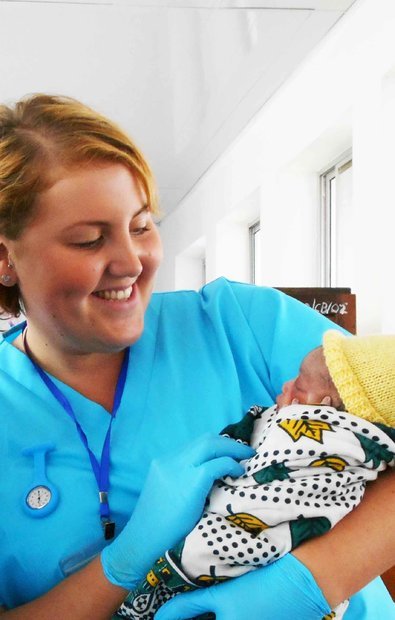Boost your career with a midwifery elective placement abroad
Go on a once-in-a-lifetime midwifery elective abroad with Work the World, and you’ll get career-boosting clinical experience in an overseas hospital. Then, you’ll have life-changing travel experiences with new friends in your free time.
You are in total control — you tell us what you want to experience, and we'll tailor your midwifery placement abroad to your specific interests. You choose everything from the destination to the individual departments you want to get experience in.
You’ll find the experience to be life-changing. And that’s true whether you’re undertaking an elective for midwifery students or graduates.
Why go on a midwifery placement abroad?
- Unique experience that puts you ahead of your peers
- Stand out to employers
- Strengthen your academic profile
- Build a network to tap into during your career
- Gain perspective that reframes your view of the NHS
- Build confidence by stepping out of your comfort zone
- Get inspiration around where you might specialise
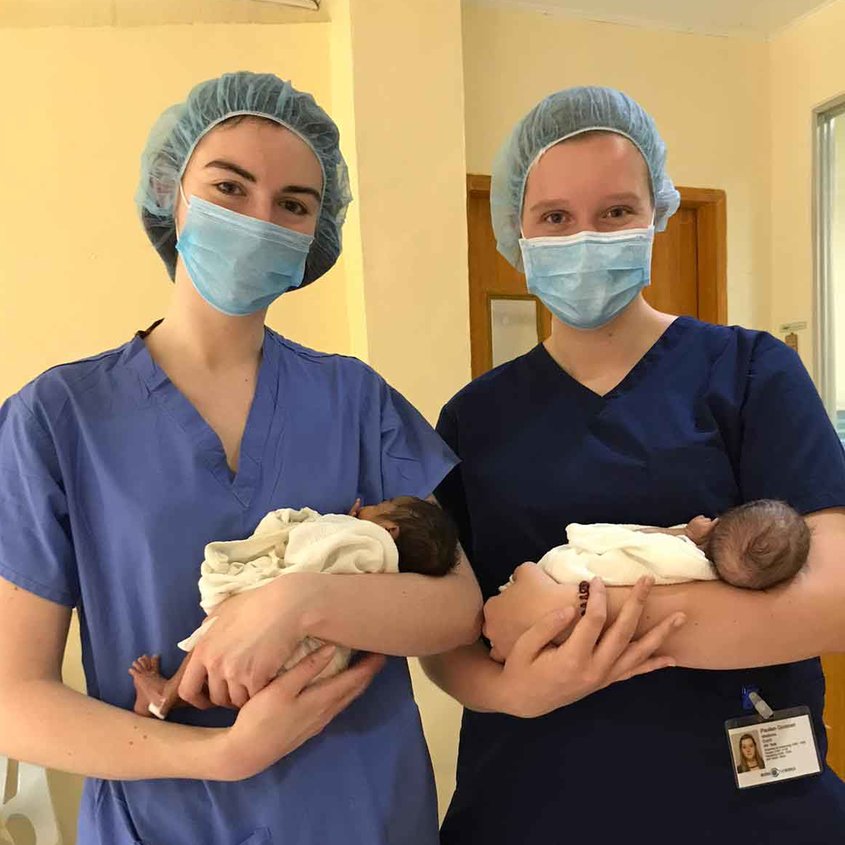
"I gained insight into the midwives’ lives and how they practised. I felt I was part of the team." - Clare, University of Huddersfield
Read more midwifery reviews here
Eye-opening clinical Placement
Our midwifery elective placements are centred on gaining perspective through new experiences. You’ll quickly learn that things we take for granted, like woman-centred care, are luxuries found only in the wealthiest healthcare systems.
Some things you will observe on your midwifery elective placement include:
- Episiotomies being performed as a first resort
- A distinct lack of privacy for labouring women
- Surprising cultural attitudes towards childbirth
- No available pain relief throughout the birthing process
You will also see major differences in the fundamentals of midwifery. For example, in some of our destinations, applying fundal pressure is a common practice and is considered safe.
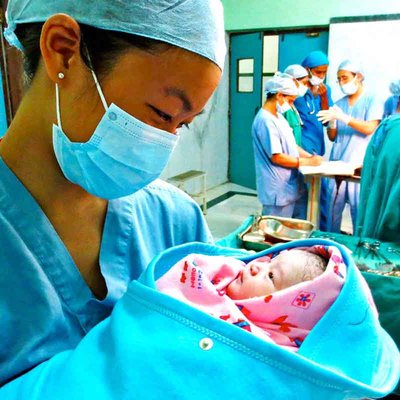
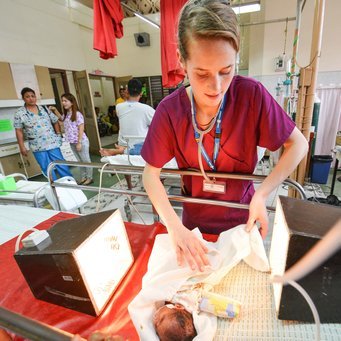
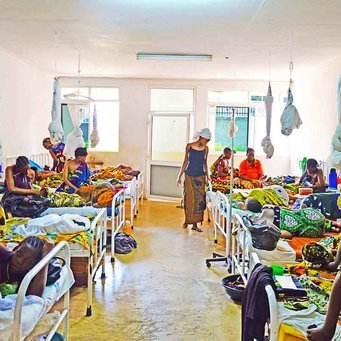
Tap into our hospital partnerships
Our long-established international hospital partnerships let us tailor your placement down to a level of detail that would be impossible if you were trying to organise your trip independently.
The partnerships also allow us to guarantee things like your hospital placement, supervision, and your choice of departments. You'll get detailed information on all of the above long before you travel.
You also get an exceptional level of flexibility should you want to amend your midwifery placement choices while you're overseas. All of this means you can create a placement suited perfectly to you, without the risk of your elective plans falling through.
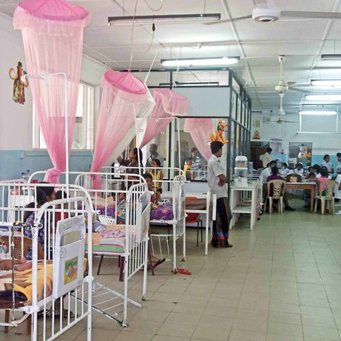
Once-in-a-lifetime travel
As a midwifery student or graduate, your clinical placement is the focus of your trip. But your free time in the afternoons and weekends will be packed full of experiences like:
- Relaxing on palm-lined, white-sand beaches
- Getting close to elephants, lions and giraffes on safari
- Swimming with curious sea turtles on warm tropical reefs
- Hiking (or paragliding!) through the Himalayas
- Spending a weekend hopping between paradise islands
But it's the people you share it with that make learning about midwifery abroad memorable. You'll live with other healthcare students and graduates in a big private house.




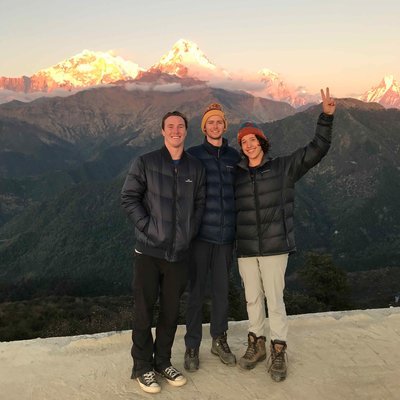
What's included?
The service you get with us is end-to-end. That means we will support you before, during and even after your trip.
You'll get:
- Pre-departure preparation with our UK team
- Structured, supervised midwifery placement abroad
- Private, catered accommodation
- 24/7 in-country team
- Airport pick up and drop off
- + more
Arrivals are every Sunday, 52 weeks of the year — you can travel on your midwifery elective placement when it suits you. The duration of placements for midwifery students starts from one week.
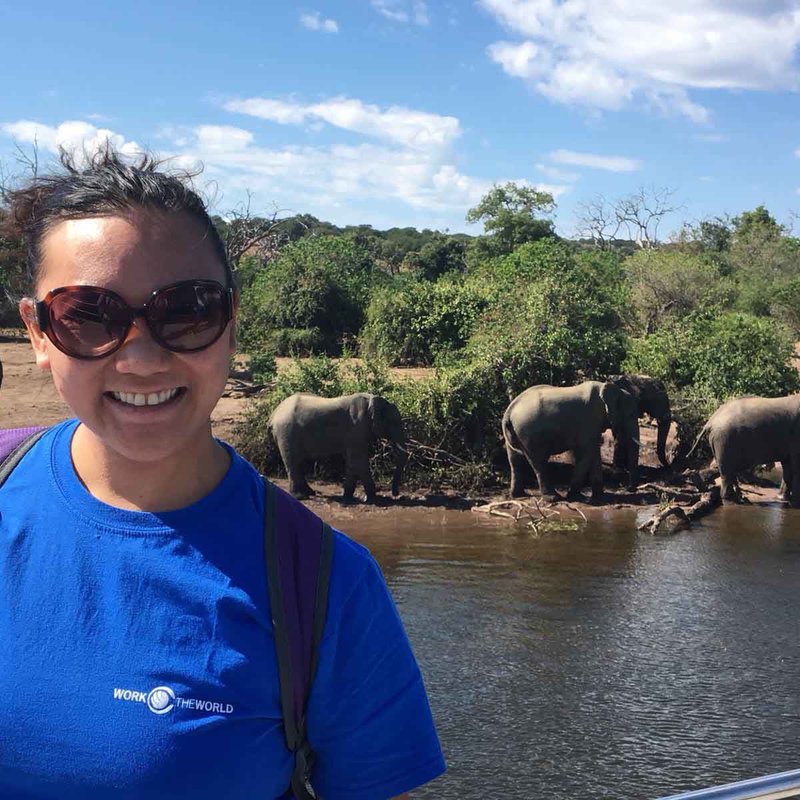
DESTINATIONS
Ghana - Takoradi

Find out more

In Ghana, healthcare is not free. No payment, no care. That means prenatal care, something we take for granted in the UK, is a luxury that only a tiny number of women in Takoradi benefit from. For some women, this leads to serious intrapartum complications (like a breech baby) further down the line. On a midwifery elective placement in Takoradi, you’ll see that there are differences in the care itself too, like a lack of maternity support during labour. Local midwives often keep a distance from the mother and let them deliver naturally. There’s a lack of intrapartum monitoring too, which is very different from UK practise. Read stories from those who’ve already travelled with us to Takoradi.

Sri Lanka - Kandy

Find out more

One of the first things you’ll notice on a midwifery elective placement in Kandy is that there are more patients than there are beds. This shows how a lack of resources has a direct impact on patient care. Low resources also affect how staff are able to do their jobs. For example, you might see that staff have different attitudes towards things like terminations and miscarriages. In the UK, cases like this are normally handled and discussed with sensitivity. In Sri Lanka, local staff take a matter of fact approach. Out of necessity, they will prioritise patients’ physical welfare, sacrificing the emotional aspects of care. Read stories from those who’ve already travelled with us to Kandy.

Tanzania - Dar es Salaam

Find out more

A midwifery internship in Dar es Salaam will see you with local midwives on the wards. You’ll see women giving birth before they even reach the labour wards, as there are too few beds. Resources for midwives are low here, so women must bring their delivery packs containing cotton wool, sterile gloves, and a razor blade for episiotomies and cord cutting. You will also encounter cultural differences while practising midwifery in Africa. For example, Tanzanian women are expected to show strength during labour. If they make too much noise, local midwives may slap them on the leg and give them a telling-off. Read stories from those who’ve already travelled with us to Dar es Salaam for their midwifery placement in Africa. Read stories from those who’ve already travelled with us to Dar es Salaam for their midwifery placement in Africa.

Vietnam - Hue

Find out more

If you do your elective in Hue, you’ll spend your time in the OBG department in a big, bustling university teaching hospital. You can get experience in lots of different areas while you’re on placement, with local midwives helping to get you involved in all areas of maternal and infant paediatric care. You’ll learn a lot about Vietnamese traditions surrounding birth too. Some local people believe that making too much of a fuss of a newborn baby attracts bad spirits. Others believe that complementing the mother too much brings bad luck. Getting experience with cultural differences like these is a big part of what makes an overseas placement special.

Philippines - Iloilo

Find out more

On a midwifery elective in Iloilo, you’ll see major differences in practise between the UK and the Philippines. If a doctor isn’t quite ready for a delivery, local midwives will often apply pressure to where the baby is presenting to prevent the baby’s descent. The local hospital has a high patient load, so don’t be surprised to see patients sharing beds. You may also see more fetal abnormalities than you would back home, hydrocephalus, exomphalos and anencephaly included. You’ll also see that women with birthing complications and other risk factors, like preeclampsia, hypertension and twin births, are not separated. Read stories from those who’ve already travelled with us to Iloilo.

Nepal - Kathmandu

Find out more

On your elective placement in Kathmandu, you’ll see that HIV is much more common in Nepal than it is in the UK. Evidence suggests that babies are more likely to die from a lack of breastfeeding than from the virus, so mothers continue the practise. As is common in many developing countries, social and cultural factors can affect the care women receive. Religion, a woman’s occupation, cost, and having to seek permission from their husbands can prevent women from getting treatment even for routine procedures. And in spite of the efforts of local midwives, the rate of infant mortality in Nepal has actually risen in recent years. Read stories from those who’ve already travelled with us to Kathmandu.


"I had no idea that by spending two weeks in a Ghanaian hospital how much my confidence would grow in relation to midwifery, and me as a person too."
Amy New, Staffordshire University 2021
Read moreWhat do our midwifery electives offer?
A Work the World midwifery elective placement gives you the chance to undertake a clinical placement in a low-resource country. You will spend time in a low-resource hospital and see unfamiliar practices and advanced conditions. You can even choose the departments you want to rotate through. Learn more here.
What are the benefits of a Work the World midwifery elective?
The benefits of our midwifery electives include:
- Expanding your clinical knowledge and skill set
- Becoming more confident, independent and resourceful
- Making yourself more attractive to employers
- Doing some proper travelling
- Building your personal and professional network
- Sharpening your language and communication skills
- Renewing your perspective on the NHS
How long is a Work the World midwifery elective?
A midwifery elective placement is as long as you want it to be. Our minimum placement duration is one week, but students typically travel on their midwifery electives for 4 weeks. There is no upper limit to how long you can travel. Further information can be found here.
